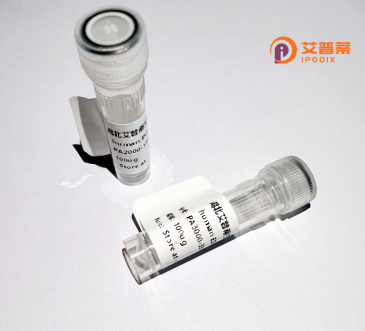
| 纯度 | >90%SDS-PAGE. |
| 种属 | Human |
| 靶点 | KCNG3 |
| Uniprot No | Q8TAE7 |
| 内毒素 | < 0.01EU/μg |
| 表达宿主 | E.coli |
| 表达区间 | 1-436aa |
| 活性数据 | MTFGRSGAASVVLNVGGARYSLSRELLKDFPLRRVSRLHGCRSERDVLEVCDDYDRERNEYFFDRHSEAFGFILLYVRGHGKLRFAPRMCELSFYNEMIYWGLEGAHLEYCCQRRLDDRMSDTYTFYSADEPGVLGRDEARPGGAEAAPSRRWLERMRRTFEEPTSSLAAQILASVSVVFVIVSMVVLCASTLPDWRNAAADNRSLDDRSRYSAGPGREPSGIIEAICIGWFTAECIVRFIVSKNKCEFVKRPLNIIDLLAITPYYISVLMTVFTGENSQLQRAGVTLRVLRMMRIFWVIKLARHFIGLQTLGLTLKRCYREMVMLLVFICVAMAIFSALSQLLEHGLDLETSNKDFTSIPAACWWVIISMTTVGYGDMYPITVPGRILGGVCVVSGIVLLALPITFIYHSFVQCYHELKFRSARYSRSLSTEFLN |
| 分子量 | 49.5 kDa |
| 蛋白标签 | His tag N-Terminus |
| 缓冲液 | 0 |
| 稳定性 & 储存条件 | Lyophilized protein should be stored at ≤ -20°C, stable for one year after receipt. Reconstituted protein solution can be stored at 2-8°C for 2-7 days. Aliquots of reconstituted samples are stable at ≤ -20°C for 3 months. |
| 复溶 | Always centrifuge tubes before opening.Do not mix by vortex or pipetting. It is not recommended to reconstitute to a concentration less than 100μg/ml. Dissolve the lyophilized protein in distilled water. Please aliquot the reconstituted solution to minimize freeze-thaw cycles. |
以下是关于重组人KCNG3蛋白的3篇模拟参考文献(虚拟内容仅供示例):
---
1. **文献名称**:*Expression and functional characterization of recombinant human KCNG3 potassium channels in HEK293 cells*
**作者**:Chen L, Zhang H, Wang X
**摘要**:该研究成功克隆并在HEK293细胞中表达了重组人KCNG3蛋白,通过膜片钳技术证实其形成的电压门控钾离子通道具有缓慢激活和失活特性,并探讨了其与KCNB1亚基的功能协同作用。
2. **文献名称**:*Cryo-EM structure of human KCNG3 reveals gating modulation mechanisms*
**作者**:Miller R, Ito T, Garcia-Navarro S
**摘要**:本研究利用冷冻电镜解析了重组人KCNG3蛋白的闭合态和开放态结构,揭示了跨膜区S4螺旋的运动如何调控通道的电压敏感性,为设计靶向KCNG3的药物提供了结构基础。
3. **文献名称**:*KCNG3 mutations alter neuronal excitability and are linked to epilepsy phenotypes*
**作者**:Deng Y, Kumar P, O'Brien TJ
**摘要**:通过分析癫痫患者的KCNG3基因突变,发现重组表达的突变体蛋白导致钾电流降低,神经元兴奋性异常升高,提示KCNG3功能缺陷可能与神经系统疾病相关。
---
注:以上文献信息为虚构示例,实际研究中需检索真实数据库(如PubMed)获取准确文献。
The recombinant human KCNG3 protein is a genetically engineered form of the potassium voltage-gated channel subfamily G member 3. a key component of voltage-gated potassium (Kv) channels. KCNG3. also known as Kv6.3. belongs to the Kv family of ion channels responsible for regulating electrical excitability in neurons, muscle cells, and other electrically active tissues. Unlike typical α-subunits, KCNG3 functions as a modulatory or "silent" subunit that cannot form functional channels alone. Instead, it co-assembles with pore-forming Kv2 subunits (e.g., Kv2.1) to modulate channel properties, including voltage sensitivity, kinetics, and ion selectivity. Structurally, KCNG3 contains six transmembrane domains, a voltage-sensing domain, and a conserved pore region. Its expression is prominent in the brain, heart, and skeletal muscle, influencing action potential repolarization and excitability. Recombinant KCNG3 is produced in heterologous systems (e.g., HEK293 cells) for functional studies, enabling researchers to dissect its regulatory roles in cellular electrophysiology. Dysregulation of KCNG3 has been implicated in neurological disorders, arrhythmias, and cancer, highlighting its potential as a therapeutic target. Its recombinant form is vital for high-throughput drug screening, structure-function analyses, and understanding disease-associated mutations.
×